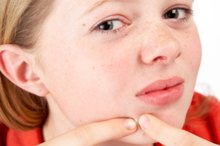What does fact checked mean?
At Healthfully, we strive to deliver objective content that is accurate and up-to-date. Our team periodically reviews articles in order to ensure content quality. The sources cited below consist of evidence from peer-reviewed journals, prominent medical organizations, academic associations, and government data.
- MayoClinic.com: Acne
- National Institute of Arthritis and Musculoskeletal and Skin Diseases: What is Acne?
- Skin Therapy Letter: Does Diet Really Affect Acne?
- Skin Therapy Letter: Does Diet Really Affect Acne?
- MayoClinic.com: Food Allergy
The information contained on this site is for informational purposes only, and should not be used as a substitute for the advice of a professional health care provider. Please check with the appropriate physician regarding health questions and concerns. Although we strive to deliver accurate and up-to-date information, no guarantee to that effect is made.
Mayonnaise & Acne
Acne is one of the most common skin conditions that affects people of any age, especially during the teen and early adult years, according to the American Academy of Dermatology 1. This condition causes painful and unsightly bumps on the skin, which can take days or even weeks to heal, depending on the severity. While the ingestion of mayonnaise probably won't affect your acne, you may want to keep it away from your skin.
Identification
The main cause of acne is the overproduction of oil, known as sebum, that your body produces to keep your skin moist, according to MayoClinic.com 27. When sebum mixes with the dead skin cells your body sheds regularly, it can form a soft plug, which builds up in the pore of your skin, leading to a localized bacterial infection. This infection causes a pimple, white head, black head, cyst or nodule. Hormonal changes, especially during puberty or pregnancy, can trigger acne, as can certain medications or the use of makeup or other skin care products that contain ingredients that clog pores, according to the National Institute of Arthritis and Musculoskeletal and Skin Diseases 3.
Mayonnaise
How to Treat Acne on a Bald Head
Learn More
Mayonnaise is a creamy spread, commonly used in sandwiches or as a base dressing in salads. It is considered an emulsion, containing 65 percent vegetable oil along with eggs, vinegar, lemon juice and seasonings, according to The Association for Dressings and Sauces. Ingesting greasy foods that contain oil, such as mayonnaise, has not been shown to cause acne, according to NIAMS. Direct skin contact with oils, such as the vegetable oils contained in mayonnaise is a different story. The Nemours Foundation website KidsHealth recommends that after skin contact with vegetable oils, you should wash these areas well to remove the potentially acne-causing oils 4.
- Mayonnaise is a creamy spread, commonly used in sandwiches or as a base dressing in salads.
- It is considered an emulsion, containing 65 percent vegetable oil along with eggs, vinegar, lemon juice and seasonings, according to The Association for Dressings and Sauces.
Diet
According to a study in the March 2010 issue of "Skin Therapy Letter," dairy and high-glycemic-index foods can increase acne outbreaks 5. High-glycemic-index foods contain carbohydrates and have a higher potential to increase your blood sugar levels than other foods, according to MayoClinic.com 267. Because mayonnaise does not contain carbohydrates, it is not a high-glycemic-index food, nor does it contain dairy products, making it safe to eat for those suffering from acne. However, mayonnaise is mainly used in conjunction with carbohydrate-containing foods, such as bread products in sandwiches or with pasta in salads, which you may want to avoid.
- According to a study in the March 2010 issue of "Skin Therapy Letter," dairy and high-glycemic-index foods can increase acne outbreaks 5.
- Because mayonnaise does not contain carbohydrates, it is not a high-glycemic-index food, nor does it contain dairy products, making it safe to eat for those suffering from acne.
Recommendations
Home Remedy for an Infected Pimple
Learn More
If you notice a pattern of breaking out or your acne worsening, specifically after ingesting mayonnaise, you may have a food allergy to an ingredient it contains 7. Discontinue eating mayonnaise if this is the case. Consult with a dermatologist if you suffer from acne to see what treatments are available to you. Avoid picking at or squeezing acne lesions, as this can cause an infection or scarring, according to MayoClinic.com 27. Use noncomedogenic products, which contain ingredients that will not clog your pores and keep your skin clean of oils, dirt and sweat with a mild cleanser to prevent acne breakouts.
Related Articles
References
- American Academy of Dermatology: Acne: Who Gets and Causes
- MayoClinic.com: Acne
- National Institute of Arthritis and Musculoskeletal and Skin Diseases: What is Acne?
- The Nemours Foundation - KidsHealth: Why Do I Get Acne?
- Skin Therapy Letter: Does Diet Really Affect Acne?
- MayoClinic.com: Glycemic Index Diet: What's Behind the Claims
- MayoClinic.com: Food Allergy
- Zaenglein AL, Pathy AL, Schlosser BJ, et al. Guidelines of care for the management of acne vulgaris. J Am Acad Dermatol. 2016;74(5):945-73.e33. doi:10.1016/j.jaad.2015.12.037
- Gieler U, Gieler T, Kupfer JP. Acne and quality of life - impact and management. Journal of the European Academy of Dermatology and Venereology. 2015;29 Suppl 4:12-4. doi:10.1111/jdv.13191
- American Academy of Dermatology. I have acne! Is it okay to wear makeup?
- American Academy of Dermatology. Moisturizer: Why you may need it if you have acne.
- Anderson KL, Dothard EH, Huang KE, Feldman SR. Frequency of primary nonadherence to acne treatment. JAMA Dermatol. 2015;151(6):623-6. doi:10.1001/jamadermatol.2014.5254
- Merck Manuals. Acne. Updated December 2018.
Resources
Writer Bio
Based in Las Vegas, Susan Paretts has been writing since 1998. She writes about many subjects including pets, finances, crafts, food, home improvement, shopping and going green. Her articles, short stories and reviews have appeared on City National Bank's website and on The Noseprint. Paretts holds a Master of Professional Writing from the University of Southern California.









